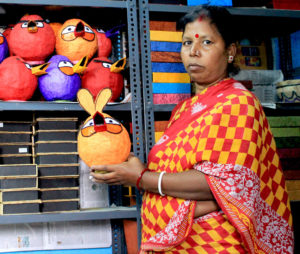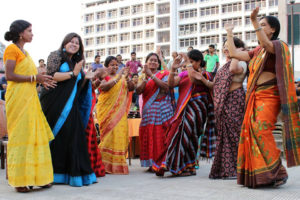Climate entrepreneurs: The citizens of dirt who are ostracized by mainstream  development and somehow survived in the shanty towns actually depend on the city’s solid waste to support their livelihood. The present intervention offers a win-win strategic paradigm providing sustainable livelihood and a clean habitat by recycling the solid waste of the city. This economic model assures small scale enterprises on the trade of recycling being led by women waste workers that helps to reduce landfill emission, pollution, and habitat destruction. Further, it transforms the women waste workers to first generation artisans, promoting a climate lifestyle
development and somehow survived in the shanty towns actually depend on the city’s solid waste to support their livelihood. The present intervention offers a win-win strategic paradigm providing sustainable livelihood and a clean habitat by recycling the solid waste of the city. This economic model assures small scale enterprises on the trade of recycling being led by women waste workers that helps to reduce landfill emission, pollution, and habitat destruction. Further, it transforms the women waste workers to first generation artisans, promoting a climate lifestyle
Gender and climate change: In the milieu of climate change the most adaptive strategy that has been talked worldwide is preparing the urban habitat. In regard to this, the first two things that strike the discussion are solid waste of the city and sanitation. Unfortunately, the women folk are actually responsible for managing the city waste that as scavengers does the work of secondary segregation in the city streets, while the most direct victim of poor sanitation in the city also remains to be the women. This intervention brings in the direct connection of women empowerment and solid waste management to establish gender-equity in climate strategies of smart cities.
Awareness and healthcare of women waste-workers: The intervention is a small spec in the field of Municipal Solid Waste Management, but its scope of expansion actually lies on the mainstreaming of thousands of socially vulnerable waste workers who are not integrated to mainstream development. To effectively reach out to this vulnerable stock of challenged women, the intervention integrates health awareness camps for them as a regular activity. These camps focus on personal hygiene, reproductive health, and childcare especially.
Solid Waste Management, but its scope of expansion actually lies on the mainstreaming of thousands of socially vulnerable waste workers who are not integrated to mainstream development. To effectively reach out to this vulnerable stock of challenged women, the intervention integrates health awareness camps for them as a regular activity. These camps focus on personal hygiene, reproductive health, and childcare especially.
Partnerships to upscale: Multistakeholder partnerships are keys to sustainability. The project intervention attempts to develop partnership chains with corporate, organizations, CSOs, urban local bodies, administration and citizens for continuing the collection and delivery chain of the production units. Value chains in production increases the scope of partnership through awareness campaigns, exhibition ales and capacity building. Presently, integrating the project with waste management strategies of municipalities has been successful.
Sustainable lifestyle education (SLE): The project intervention is a direct manifestation of the 12th Sustainable Development Goals of UNEP that emphasizes on sustainable lifestyle through wise use of resources by sustainable consumption and production. In alignment with the latest SLE program of UNEP entitled 10YFP, the intervention has focused on reduction of emission footprints of paper and textile wastes through 4R (Reuse, Reduce, Recycle and Recover).
